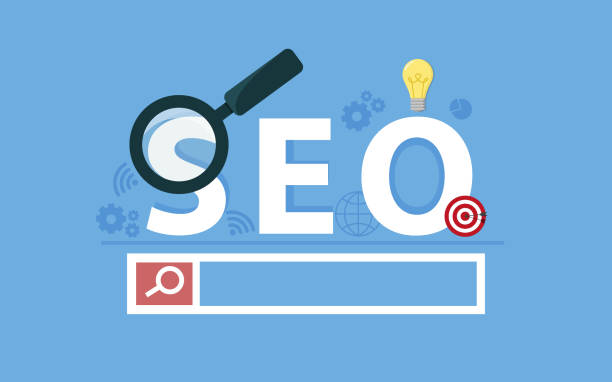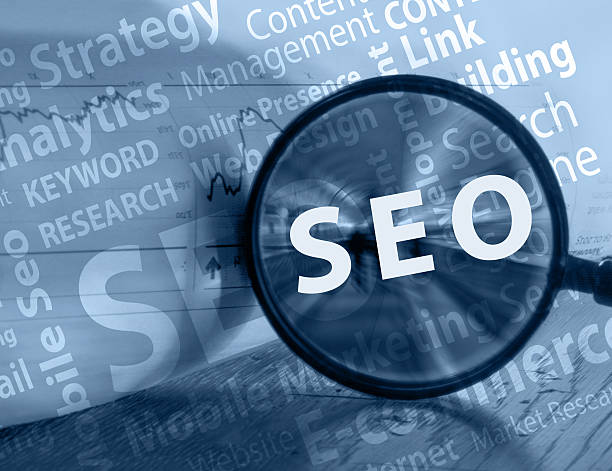What is Off-Page SEO and Why Does it Matter?

Off-Page SEO refers to a set of actions that are performed outside of your website and help improve your site’s ranking in Google search results and other search engines.
In fact, #Off_Page_SEO shows Google and other search engines that your website is reputable and valuable to other websites and users.
The importance of Off-Page SEO stems from the fact that Google views off-site signals as confirmation of the quality and credibility of your website.
The more websites that link to you (backlinks), the more likely Google is to assume that your website provides high-quality content.
Without strong Off-Page SEO, even with the best content and on-page SEO, it will be very difficult to reach the top Google rankings.
Proper Off-Page SEO helps you increase your domain authority, attract more traffic, and ultimately gain more customers.
To better understand Off-Page SEO, it is necessary to know the various factors that affect it.
Is your online sales not as expected? With Rasaweb, solve the problem of low sales and poor user experience forever!
✅ Increase the conversion rate of visitors to customers
✅ Create an enjoyable user experience and increase customer trust
⚡ Apply for a free consultation now!
Building Quality Backlinks; The Main Pillar of Off-Page SEO

Backlinks are the most important factor in Off-Page SEO.
Backlink is actually a link from another website to your website.
Google considers these links as votes of confidence.
But not every backlink is valuable.
Quality backlinks must be from reputable websites, relevant to your field of activity, and have a high ranking.
For example, a backlink from a reputable news website in the field of technology is much more valuable than a backlink from a spam website.
There are various methods for building backlinks, including:
- Producing high-quality and valuable content: If your content is useful and engaging, other websites will link to it.
- Activity on social networks: Sharing your content on social networks can lead to receiving backlinks.
- Participating in relevant forums and communities: Answering questions and providing expert opinions in forums can be an opportunity to receive backlinks.
- Building relationships with bloggers and journalists: Establishing contact with influential people in your field can lead to news coverage and receiving backlinks.
Remember that backlink building should be done naturally and gradually.
Trying to buy backlinks or using spam methods can lead to your website being penalized by Google.
Social Networks and Their Impact on Off-Page SEO
![]()
Social networks do not directly affect Google rankings, but they play an important role in Off-Page SEO.
Active presence on social networks can lead to increased brand awareness, attracting traffic, and receiving backlinks.
When your content is shared on social networks, there is a greater chance that people will link to it.
In addition, social networks can act as a communication channel with your customers and audience.
By answering questions and providing support on social networks, you can gain customer trust and loyalty.
To optimally use social networks in Off-Page SEO, you must:
- Optimize your profiles: Provide complete and accurate information about your business.
- Produce engaging and relevant content: Create content that is engaging and valuable to your audience.
- Be active regularly: Regularly publish new content and interact with your audience.
- Use relevant hashtags: Use hashtags that help users find your content.
| Social Network | Impact on Off-Page SEO | Key Tips |
|---|---|---|
| Increase brand awareness, attract traffic | Use attractive images and videos, interact with the audience | |
| Create professional relationships, share specialized content | Optimize profile, participate in relevant groups | |
| Publish up-to-date news and information, fast interaction with the audience | Use relevant hashtags, reply to tweets |
High-Quality Content; The Main Fuel of Off-Page SEO

High-quality content is not only important for on-page SEO, but also plays a key role in Off-Page SEO.
Content that is valuable, useful, and engaging is naturally shared by other websites and receives backlinks.
In other words, good content is a powerful tool for link building.
To produce high-quality content, you must:
- Know your audience’s needs: Create content that answers your audience’s questions and problems.
- Do your research: Before writing, research the topic and provide accurate and up-to-date information.
- Use images and videos: Images and videos can make your content more engaging and understandable.
- Optimize your content: Use relevant keywords and optimize your content for search engines.
- Share your content: Share your content on social networks, forums, and other platforms.
Remember that producing high-quality content is a long-term investment that can have significant results in Off-Page SEO.
Do you have an online store but your sales are not as expected? Rasaweb solves your problem forever with professional online store website design!
✅ Significant increase in conversion rate and sales
✅ Unique user experience for your customers
⚡ Click with Rasaweb for a free consultation!
Analyzing Competitors in Off-Page SEO; Identifying Opportunities

Analyzing competitors in Off-Page SEO helps you identify their strengths and weaknesses and model their successful strategies.
By analyzing competitors’ backlinks, you can find websites that are likely to be willing to link to your website as well.
To analyze competitors in Off-Page SEO, you can use various tools such as Ahrefs, SEMrush, and Moz.
Using these tools, you can:
- Check competitors’ backlinks: See which websites competitors have received backlinks from.
- Analyze competitors’ content: See what type of content competitors are producing and what keywords they are targeting.
- Check competitors’ social networks: See how competitors are active on social networks and how many followers they have.
- Identify competitors’ link building strategies: See what methods competitors are using to build backlinks.
By analyzing the information obtained, you can design a more effective Off-Page SEO strategy for your website.
The Importance of Brand Mention in Off-Page SEO

Brand Mention refers to mentioning your brand name on websites and other online platforms without linking to your website.
Although Brand Mention is not as valuable as a backlink, it can still have a positive impact on Off-Page SEO.
Google uses Brand Mention as a trust signal.
The more your brand name is mentioned on reputable websites, the more likely Google is to assume that your business is reputable and well-known.
To increase Brand Mention, you can:
- Have strong public relations: Be in contact with journalists and bloggers and try to have your brand name mentioned in their articles and reports.
- Participate in relevant events: Participating in events related to your industry can be an opportunity to introduce your brand and receive Brand Mention.
- Produce high-quality content: High-quality content is naturally shared by other websites and may lead to Brand Mention.
- Be active on social networks: Active presence on social networks can help increase brand awareness and receive Brand Mention.
Remember that Brand Mention should be created naturally and without directly trying to receive it.
Trying to buy Brand Mention or using spam methods can lead to your website being penalized by Google.
Off-Page SEO requires planning.
User-Generated Content (UGC) and Off-Page SEO

User-Generated Content (UGC) refers to content that is produced by your users and customers, such as comments, reviews, images, and videos.
UGC can have a positive impact on Off-Page SEO because:
- It increases trust and credibility of your brand: Positive customer comments and reviews can attract the trust of other users to your brand.
- It increases your website traffic: UGC can lead to increased organic traffic to your website.
- It increases conversion rates: UGC can increase the conversion rate of visitors to customers.
To encourage users to produce UGC, you can:
- Create a survey and review system: Allow your customers to comment on your products and services.
- Hold a UGC contest or campaign: Ask your users to produce content on a specific topic and reward the best.
- Display UGC on your website and social networks: Display UGC on your website and social networks to encourage other users as well.
| Type of UGC | Impact on Off-Page SEO | Example |
|---|---|---|
| Customer reviews | Increase trust, improve conversion rates | Comments below products in an online store |
| User images and videos | Attract traffic, increase engagement | Users’ images of the product on Instagram |
| Guest blog posts | Receive backlinks, increase credibility | Guest post on a related blog |
Local SEO and Its Role in Off-Page SEO

Local SEO refers to optimizing your website and online presence to attract local customers.
Local SEO is closely related to Off-Page SEO because:
- Registering your business in local directories: Registering your business in local directories such as Google My Business, Yelp, and Foursquare can help increase your visibility in local search results.
- Receiving positive comments and reviews: Positive comments and reviews from local customers can attract the trust of other local users to your business.
- Building local links: Receiving backlinks from local websites such as local news websites and local communities can improve your ranking in local search results.
To improve your local SEO, you must:
- Register your business in Google My Business: Provide complete and accurate information about your business and update it regularly.
- Register in local directories: Register in reputable local directories.
- Ask your customers to register their comments and reviews: Ask your customers to register their comments and reviews in Google My Business and other platforms.
- Cooperate with local websites: Cooperate with local websites to receive backlinks.
Research shows that 80% of customers trust companies with professional websites more. Does your current website build that trust?
With Rasaweb’s corporate website design services, solve the problem of customer mistrust and a weak online image forever!
✅ Create a professional image and increase customer trust
✅ Attract more sales leads and grow your business
⚡ Get a free consultation
Measuring and Analyzing Off-Page SEO Results

Measuring and analyzing Off-Page SEO results is essential to evaluate the effectiveness of your strategies and identify opportunities for improvement.
Using various tools such as Google Analytics, Google Search Console, and SEO tools, you can:
- Track your website’s organic traffic: See how much traffic is coming to your website from search engines.
- Check your keyword rankings: See what keywords your website ranks for in search results.
- Check your backlinks: See which websites you have received backlinks from.
- Track your brand mentions: See what websites your brand name has been mentioned on.
By analyzing this information, you can:
- Improve your Off-Page SEO strategies: Identify the strengths and weaknesses of your strategies and improve them.
- Identify new opportunities: Identify new opportunities for building backlinks, receiving brand mentions, and improving local SEO.
- Optimize your budget: Allocate your budget in the best possible way to strategies that have the highest returns.
Off-Page SEO is an ongoing process that requires continuous measurement and analysis.
Common Mistakes in Off-Page SEO and How to Avoid Them

In Off-Page SEO, making some mistakes can damage your website’s ranking instead of helping it.
Some common mistakes in Off-Page SEO include:
- Buying backlinks: Buying backlinks can lead to your website being penalized by Google.
- Using spam methods: Using spam methods such as mass link building and spam commenting can damage your website’s ranking.
- Ignoring backlink quality: Don’t just pay attention to the number of backlinks, but also pay attention to their quality.
Quality backlinks are received from reputable and relevant websites. - Not paying attention to high-quality content: High-quality content is the foundation of any successful Off-Page SEO strategy.
- Not checking competitors: Checking competitors helps you model their successful strategies and avoid their mistakes.
- Not measuring and analyzing results: Measuring and analyzing Off-Page SEO results is essential to evaluate the effectiveness of your strategies and identify opportunities for improvement.
By avoiding these mistakes, you can design a more effective Off-Page SEO strategy for your website and improve your ranking in search results.
Off-Page SEO requires patience and persistence.
Frequently Asked Questions
| Question | Answer |
|---|---|
| What is Off-Page SEO? | Off-Page SEO refers to a set of activities and methods that are performed outside of your website to improve its ranking in search engines, such as building backlinks. |
| Why is Off-Page SEO important for a website? | Off-Page SEO shows search engines that your website is reputable, popular, and trustworthy, which helps increase domain authority and ranking. |
| What is the most important factor in Off-Page SEO? | Backlinks, or links from other websites to your website, are the most important factor, especially if they are from reputable sites. |
| What are the characteristics of a quality backlink? | A quality backlink comes from reputable sites (with high authority), relevant to the topic of your site, and with appropriate (natural) anchor text. |
| Do social networks play a role in Off-Page SEO? | Yes, sharing content on social networks can help increase visibility and indirect traffic and send positive social signals to search engines. |
| What is a PBN and is it recommended? | PBN (Private Blog Network) is a network of private websites that are used to build backlinks to the main site. Google considers this method to be spam, and its use is strictly prohibited and can lead to penalties. |
| How is natural link building done? | By producing valuable and shareable content, establishing contact with bloggers and influencers, and attracting media attention. |
| What is Anchor Text in a backlink? | It is the text in which the link is placed. Using diverse anchor texts related to the keyword looks more natural and helps SEO. |
| What is the relationship between Local SEO and Off-Page SEO? | Local SEO includes off-site activities such as registering in Google My Business, local directories, and receiving online reviews, which help businesses appear in local search results. |
| How can you check competitor backlinks? | Using tools such as Ahrefs, Semrush, or Moz, you can analyze the backlink profiles of competitors and identify new link building opportunities. |
And other services of Rasaweb advertising agency in the field of advertising
Smart Customer Journey Map: A novel service to increase click-through rate by optimizing key pages.
Smart Advertising Campaign: A professional solution for digital branding with a focus on intelligent data analysis.
Smart Conversion Rate Optimization: Designed for businesses looking to manage campaigns through the use of real data.
Smart UI/UX: Designed for businesses looking for digital branding by optimizing key pages.
Smart UI/UX: Professional optimization for managing campaigns using real data.
And more than hundreds of other services in the field of internet advertising, advertising consulting and organizational solutions
Internet Advertising | Advertising Strategy | Advertorial
Resources
What is Off-Page SEO? The Complete Guide to Off-Page SEO
,What is off-page optimization (Off-Page SEO)?
,Off-Page SEO Guide
,Off-Page SEO: A Step-by-Step Guide for Beginners
? Are you ready to grow your business in the digital world? Rasaweb Digital Marketing Agency, by providing comprehensive and innovative solutions including website design with a modern user interface and targeted marketing strategies, paves the way for your success.
📍 Tehran, Mirdamad Street, next to Central Bank, Southern Kazerun Alley, Ramin Alley No. 6
“`




